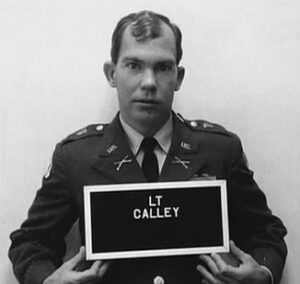
On March 16, 1968, the Charlie Company, under the leadership of Captain Ernest Medina, entered the village of My Lai in the Quang Ngai Province of Vietnam. Upset by the stresses of searching for the guerrilla forces of the Viet Cong, combined with the recent death of a popular commanding officer, the 1st Platoon, led by Second Lieutenant William Calley Jr., turned a routine search for the enemy into a bloody massacre. The number of victims is estimated to be between 347 and 504, mostly women, children, and the elderly. The men raped and mutilated the women while firing upon people huddled in groups. They pushed many people into ditches on top of the dead before executing them en masse. Several men, including Hugh Thompson, tried to stop the civilian killings and evacuated survivors to a nearby hospital. By noon that day, My Lai “was no more.”
News of the massacre incited outrage back in the United States, this anger was heightened because of a conspiracy to cover up the events, delaying release of the information for several months. Ronald Ridenhour, a former GI, had heard several accounts of that day from those who were there and sent letters to many branches of the government upon his return to the States, including President Nixon and several members of Congress. A formal investigation followed, resulting in the indictment of Calley with formal charges, including six charges of premeditated murder. Twenty-five other men were also indicted on crimes related to the massacre or the cover-up, but Calley would be the only one convicted because many of those operating under him had left the military and could no longer be prosecuted for military crimes. His defense claimed that he was only acting on Medina’s orders and was therefore not responsible; Medina himself denied giving any exact orders to murder the population of the village in his own trial, and was acquitted. Calley was found guilty following the longest deliberation in US court marital history, and was sentenced to life in prison. His sentence was then commuted by President Nixon and he spent the rest of his shortened sentence under house arrest and was paroled several years later.
The public’s disapproval of the trial and their horror at the massacre itself caused support for the entire war to decrease. This incident redefined the way in which soldiers were trained to deal with civilians in times of conflict. The My Lai massacre is regarded as one of the most appalling actions of United States troops deployed overseas. In 2009 Calley made a public apology to the victims of the My Lai massacre, but it was dismissed by survivors. One survivor wrote Calley a letter telling him that time did not heal all wounds, and that grief and sorrow would always linger over My Lai.
Back to Crime Library
|
|
|
